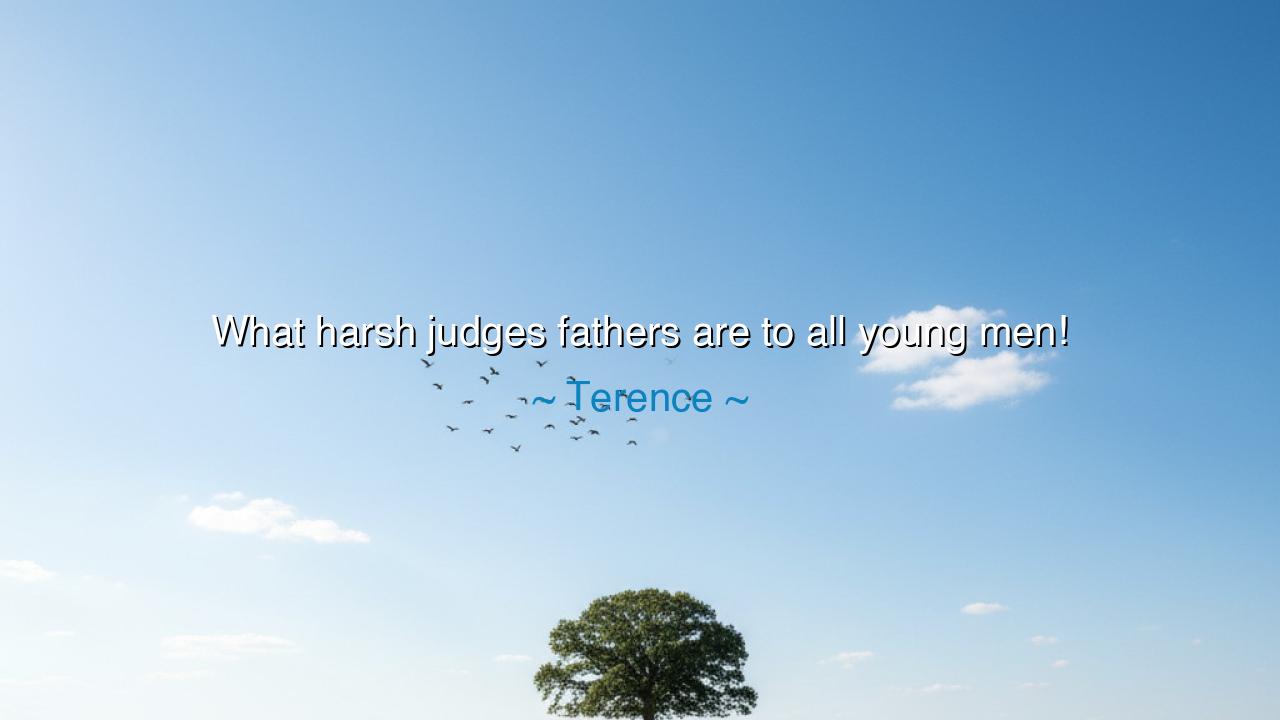
What harsh judges fathers are to all young men!






Hear the ancient voice of Terence, the Roman playwright of wisdom and wit, who declared: “What harsh judges fathers are to all young men!” In this lament — half observation, half truth — he captures the eternal tension between generations: the fire of youth seeking freedom, and the stern gaze of age guarding tradition. It is the cry of every son who feels unseen, and the sigh of every father who fears his child will repeat the follies of men. Yet within this tension lies a profound truth about love, pride, and the burden of expectation. The father judges harshly not out of hatred, but out of fear — the fear that the world will be harsher still.
The origin of this saying comes from the Roman playwright Publius Terentius Afer, known to us as Terence, who lived in the second century before Christ. Born a slave and later freed through his talent, he wrote comedies that revealed the hearts of men with both humor and sorrow. In this line, taken from one of his plays, he spoke not as a philosopher but as an observer of human life. He had seen how fathers, once young and reckless themselves, often forget the restlessness of youth. They see in their sons the mirror of their own past mistakes and seek to correct them — not gently, but with severity. Thus, judgment replaces understanding, and love is hidden beneath the mask of authority.
The ancients knew this truth well. In the myths of Greece, even the gods could not escape the conflict between father and son. Cronus, fearing that his children would overthrow him as he had overthrown his own father, devoured them in his madness. Yet from that cruelty arose Zeus, who fulfilled the very destiny his father sought to prevent. So it is with men — the father’s harshness, born of pride and protection, often becomes the fuel that drives the son to surpass him. The great cycle of struggle repeats itself, generation after generation, not out of evil, but out of the endless striving of life to grow stronger.
Consider also the tale of Johann Sebastian Bach, the master of harmony, and his son Carl Philipp Emanuel Bach, who walked in his father’s shadow. The elder Bach, devoted to the sacred traditions of his art, often criticized his son’s new and daring musical style — calling it too emotional, too unconventional. Yet history remembers that it was the younger Bach who bridged the world of the Baroque and the Classical, influencing Mozart and Beethoven themselves. What the father saw as rebellion was, in truth, evolution. From that judgment came greatness — for the son’s defiance was the seed of progress, and the father’s criticism, though harsh, sharpened the son’s resolve.
There is wisdom, then, in both sides of the conflict. The father, having seen the cruelty of the world, seeks to prepare his child by demanding discipline, strength, and restraint. The son, driven by the spirit of life itself, seeks experience, freedom, and self-expression. Both are right, and both are blind. The father forgets that wisdom must be earned through mistakes; the son forgets that freedom without restraint becomes folly. And so, through their struggle, the world turns — the old teaching the young caution, the young teaching the old hope.
But what of the harsh judgment that wounds the heart? It must be tempered with mercy. For though the father’s sternness may shape character, too much of it can break the spirit. The wise father learns to correct with love, not pride; to remember his own youth when he sees rebellion in his child’s eyes. Likewise, the wise son learns patience — to see in his father’s judgment not rejection, but concern; not tyranny, but fear disguised as strength. When both come to understand this, the judgment softens, and what was once conflict becomes kinship.
Let this be the lesson to all generations: harshness may teach obedience, but only compassion teaches understanding. The father must learn to guide without crushing, and the son must learn to listen without resentment. For the measure of a man is not how loudly he demands to be right, but how deeply he strives to understand. The bridge between generations is built not by words of authority, but by the quiet courage to forgive — the father forgiving his son’s youth, the son forgiving his father’s fear.
So remember the words of Terence, for they are both warning and wisdom. “What harsh judges fathers are to all young men!” Yet beyond that judgment lies a hidden truth: that love, though stern in its expression, is still love. The father who judges too harshly may yet teach strength, and the son who rebels may yet teach renewal. When each learns to see the other not as enemy but as reflection, peace will come — and with it, the deepest kind of understanding that binds one generation to the next in the unbroken chain of humanity.






AAdministratorAdministrator
Welcome, honored guests. Please leave a comment, we will respond soon